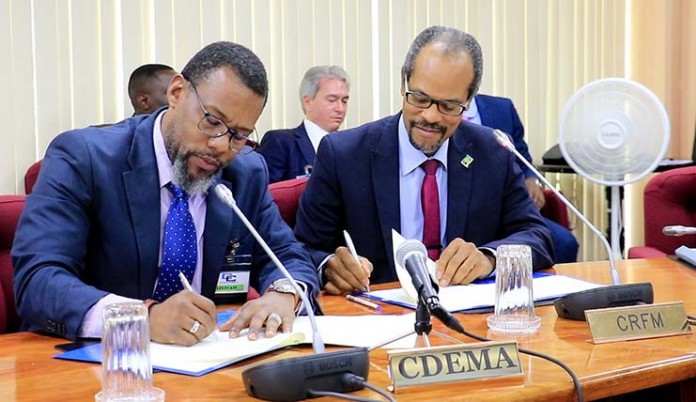CRFM and CDEMA sign agreement to enhance disaster management and resilience in fisheries
The Caribbean Regional Fisheries Mechanism (CRFM) recently signed a memorandum of understanding with the Caribbean Disaster Emergency Management Agency (CDEMA) to enhance comprehensive disaster management and climate change resilience in the fisheries and aquaculture sector within the Caribbean Community (CARICOM).
CRFM Executive Director, Milton Haughton, signed the MOU for CRFM while the Executive Director of CDEMA, Ronald Jackson, signed on behalf of CDEMA. The signing took place during the Tenth General Meeting of the Caribbean Community (CARICOM) and the United Nations (UN) System, on Wednesday, 24 July 2019, in Georgetown, Guyana.
The CRFM Executive Director said: “This MOU was prepared to facilitate enhanced cooperation between the CRFM and CDEMA, recognizing the need for effective and progressive responses to the urgent and growing threats of climate change and associated hazards, as well as the vulnerability of our fisherfolk and fishing communities which constitute a very important part of our food production system.”
Immediate attention will be given to cooperation for sustained support for the Fisheries Early Warning and Emergency Response (FEWER) ICT Solution that had been spearheaded by the CRFM during 2017-18 in the course of the Regional Track of the Pilot Programme for Climate Resilience (PPCR), supported by the Inter-American Development Bank and The Mona Office of Research and Innovation (MORI) at the University of the West Indies (UWI), Jamaica.
Other areas of cooperation include joint project initiatives, training, capacity building and awareness activities, data and information collection and dissemination, and a support mechanism to help CARICOM countries and fishing communities prepare for and manage the threats and risks arising from manmade and natural hazards, including storms and hurricanes. The agreement also addresses post-disaster rehabilitation and recovery support for the restoration of services, infrastructure and livelihoods, as well as the restoration of the physical and ecological integrity of the affected coastal ecosystems.
In commenting on the signing, the Executive Director of CDEMA indicated that, “This represents CDEMA’s commitment to partnerships with other regional Institutions in an effort to advance resilience.” He expressed enthusiasm that CDEMA would be able to support the hosting infrastructure for the FEWER ICT Solution. Mr. Jackson furthermore pointed out this was in keeping with CDEMA’s role in advancing a comprehensive programme for Multi-Hazard Early Warning Systems, as well as serving as a regional hub for warning infrastructure.
FEWER reduces fishers’ vulnerability to the impacts of climate change but also allows them to share local ecological knowledge to inform climate-smart fisheries planning and management, decision-making, as well as risk management in the fisheries sector. During 2017-18, the CRFM, IDB and UWI ICT experts worked with government authorities and fishers in Dominica, Grenada, Saint Lucia, and Saint Vincent and the Grenadines to pilot the development of the FEWER. The CRFM-CDEMA partnership is an essential step towards sustainably rolling out FEWER to other countries.
The CRFM’s Ministerial Council had signaled its support at its 13th Regular Meeting held this June 2019 in Saint Kitts and Nevis, for the CRFM’s partnership with CDEMA, which had been developing as both CARICOM inter-governmental agencies mobilized to support to Member States in the wake of Hurricanes Irma and Maria in September 2017.
In October 2018, the Council approved a protocol on climate change and disaster risk management under the Caribbean Community Common Fisheries Policy, for which the CRFM has the implementation lead.
The CRFM has also been working with the CCRIF and World Bank to introduce risk insurance to protect the fisheries sector against disasters. The Caribbean Oceans and Aquaculture Sustainability Facility (COAST) Parametric insurance policy for the fisheries sector was launched at the beginning of July 2018. The policy was developed by CCRIF and the World Bank with support from the Government of the USA.
The 17 Member States of the CRFM are also members of CDEMA. They are Anguilla, Antigua and Barbuda, Commonwealth of the Bahamas, Barbados, Belize, Commonwealth of Dominica, Grenada, Republic of Guyana, Haiti, Jamaica, Montserrat, St. Kitts & Nevis, Saint Lucia, St. Vincent & the Grenadines, Suriname, Republic of Trinidad & Tobago, Turks & Caicos Islands. The Virgin Islands is the only CDEMA member that is not a member of the CRFM.





